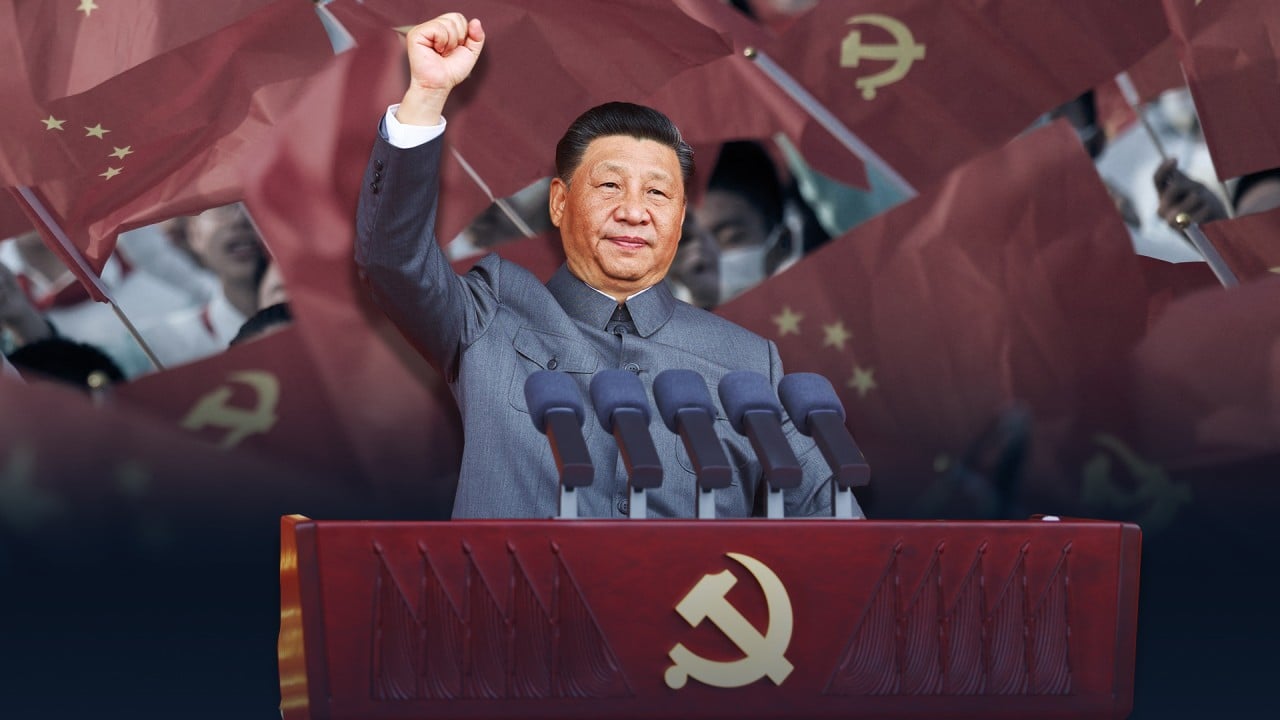
Sixth plenum: with Xi at the helm, a new era when China becomes strong
- To appreciate the deep message of the sixth plenum, we should look to party history
- In Mao’s era, China ‘stood up’. In Deng’s era, China ‘became rich’. This plenum sets the stage for the great rejuvenation of the Chinese nation, with Xi in charge
The sixth plenary session of the 19th Central Committee of the Communist Party, according to the official language, “comprehensively reviews the major achievements made and the historical experience accumulated during the Party’s 100 years of struggle”.
As the party sees it, the sixth plenum stands at a “new historical starting point” of the “second centenary goal” – to transform China into a fully modernised, socialist nation by the 100th anniversary of the People’s Republic of China in 2049 – and in this context, the sixth plenum can be said to be motivated by three “deep understandings”: historical context, learning the present to shed light on the future, and serving and satisfying the people.
The plenum holds up the banner, in the party’s argot, of socialism with Chinese characteristics, which requires strengthening the four consciousnesses, fortifying the four matters of confidence and achieving the two safeguards, thus ensuring that the whole party moves forward in unison.
In the run-up to the plenum, the party’s General Secretary Xi Jinping has been praised for “the magnificence, vision and grand strategy of a Marxist statesman” and lauded for his “extraordinary strategic determination, superb strategic thinking and scientific strategic decision-making”.
It comes as no surprise that to many foreigners, the language sounds turgid, repetitive, obsequious, opaque – party-speak of little consequence. To China watchers, the semiotics is blazing: the language consolidates and strengthens the leadership of the party in general and of Xi in specific.
However, notwithstanding the plethora of commentary, few see the sixth plenum for what it really is: one link, albeit a critical link, in a long chain of interconnected political events that culminate in the formal recognition of China’s “new era”, led by the Party and with Xi as the core of the Party’s Central Committee and of the whole party. Only a leader with overwhelming authority can reinterpret party history.
From the party’s perspective, both of these prior resolutions unified thinking and gathered strength to complete new historical tasks, which is exactly what the party expects from the sixth plenum under general secretary Xi.
But both prior resolutions also involved blunt critiques of contentious problems: for Mao, overcoming severe inner-party politics to attain sole leadership; for Deng, resolving divisive inner-party issues from the chaotic Cultural Revolution (1966-1976). Both previous resolutions consolidated the party under its core leader, quashed dissenting views, and opened a “new era”. In Mao’s era, China “stood up”. In Deng’s era, China “became rich”.
Now, for the party’s third resolution on history, the parallels are striking: consolidating the party under its core leader to commence a third “new era”. In Xi’s era, China “becomes strong”.
However, there are differences between the first two and this third resolution, in that there is now no overt need to resolve past disputes, no lingering negative issues to clean up. The emphasis now is on appreciating the achievements of the past, formulating the goals for the future, and setting forth the policies to bring it all about.
Here, I would like to describe the chain of political events beginning with the party’s 18th National Congress in late 2012, when Xi became senior leader, and which lead up to and will stretch beyond the sixth plenum.
Now, in 2021, comes the fifth link, the sixth plenum confirming the commencement of the new era with Xi as the core of the party and at the helm of the country – and as only the third Chinese leader, preceded by Mao and Deng, to open a new era. This plenum will set the stage for the sixth and final link of the chain spanning the full 10 years of Xi’s two terms.
The sixth link, in late 2022, will be the party’s 20th National Congress, which will present the grand vision and articulate specific objectives for the years 2035 and 2049/2050, towards the great rejuvenation of the Chinese nation, with Xi, with an almost certain third term, unequivocally and unsurpassably in charge for the foreseeable future.
Robert Lawrence Kuhn, a public intellectual and international corporate strategist, won the China Reform Friendship Medal (2018). Adam Zhu also contributed to this article


